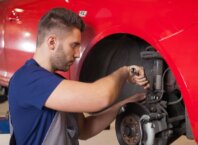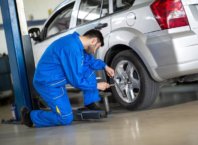I’ve yet to find someone who doesn’t want to reduce the amount of fuel that they use in their car. Of course, there are always exceptions, but most people that I know are running cars on tight budgets – whether for personal or business use.
If you want to reduce the amount of fuel that you use whilst not compromising on your driving experience, looking at your fuel efficiency could really help.
Fuel efficiency is actually a relatively simple concept to get your head around: it describes how well an engine turns fuel into energy. A more efficient engine will use less fuel to produce energy which means that you won’t have to fill up your fuel tank as often.
I’ve decided to have a closer look at tips that you can use to improve your overall fuel efficiency.

1. Don’t drive with the air-con on (when you don’t need it)
Driving everywhere with the air-conditioning on in your car is a sure-fire way to guzzle gas.
Your air conditioning unit gets its power directly from the engine. This means that it’s essentially powered by the fuel that you burn (rather the electricity that’s generated by your battery when driving). That’s an important distinction to bear in mind, because it’s one that can increase your fuel cost if you’re not careful.
The Canadian Government says that using your air conditioning can increase the load on your engine and increase your fuel consumption by around 20%. You can reduce this by just turning down your AC unit slightly.
Admittedly, the savings won’t exactly be massive but every little step that you can make towards reducing your overall fuel consumption is obviously going to help you a lot in the long term.
2. Try not to drive with a heavy load
Okay, I’m not saying that everyone drives around with a broken refrigerator in the back of their car constantly, but it’s surprisingly easy to load your car up with junk that needs to go to the city dump and then just keep forgetting to take it there. (Just me?)
Regardless, reducing the amount that you drive with heavy loads in your car will obviously reduce the amount of fuel you use in the process. Heavy loads obviously require more energy from the engine to move, hence more fuel being burned.
As long as you don’t make a habit of driving around everywhere with cast-iron anvils in the back of your auto, you should be fine. Just bear this tip in mind so that you can avoid burning through your fuel for the month.
3. Drive slower!
Unless you’ve got a particular death-wish, there isn’t really a need to hurtle around at top speeds everywhere. In fact, doing this will obviously be costing you a lot more in fuel.
Taking steps to drive slower is one way that you can significantly reduce your fuel consumption over time. An average highway speed of 55mph (90km/h) is thought to be the best speed to drive at in terms of getting best miles per gallon of fuel.
After all, the internal combustion engine in your car has to work harder and burn more fuel, the faster you force it to go. It’s only logical that reducing your speed can help to reduce the size of your fuel bills in the long term.
4. Keep your tires in great condition
Chances are you haven’t really considered this tip, but it’s a really important one– keeping your tires in a good condition can actually help you get the most bang for your buck in terms of fuel consumption.
The science behind this is quite complicated, but essentially one of the secrets of a car’s fuel consumption is in the rolling resistance of its tires– basically, how much energy is needed to move the tire and the axle.
Deflated tires will make more contact with the road, raising the rolling resistance and requiring more energy (ie. fuel) to turn. Worn tires will also slip on the road, again increasing the amount of energy that is needed to turn the axle of the car.
So, what’s the moral of this story? Keep your tires properly inflated if you want to save money and make the most out of your fuel!
5. Reduce your revving!
When you rev your engine (push down on the accelerator when the car is in neutral to give it), you force the engine to provide energy. Logically then, the more revs you use, the harder you’re asking the engine to work, and that means one thing– more fuel being burned.
Trying to reduce the amount of revs that you give the car to get it moving is something that takes a bit of skill but it can really help you increase your fuel efficiency.
About the Author
Tom Butcher is a freelance writer, covering a wide range of topics, including finance, business and motoring. At the moment, he is helping LeaseFetcher tell the world about contract hire and leasing.







